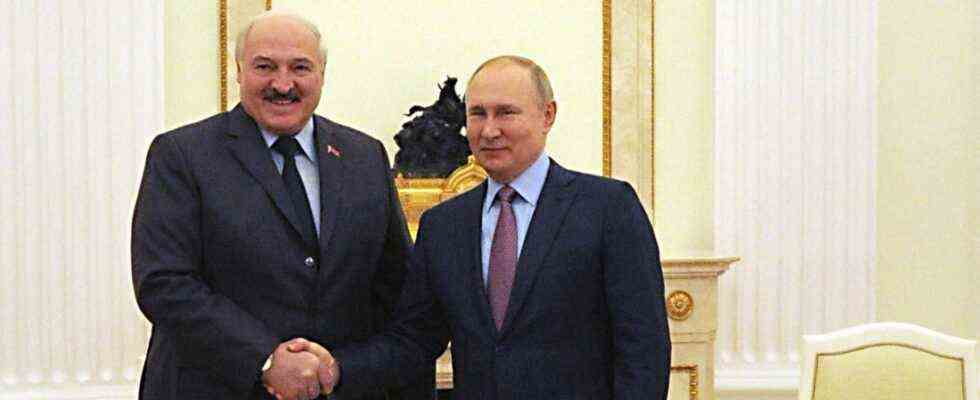Alexander Lukashenko was reliable. The ruler of Belarus was in Moscow on Friday and brought a kind of token of loyalty to his host Vladimir Putin. Lukashenko said the Russian-Belarusian maneuvers are a joint response to the West. About 30,000 Russian soldiers are currently on Belarusian territory, and the big question is whether they will withdraw after the exercise ends this Sunday. And if so, when. They still wanted to decide. Ukraine fears troops will stay.
Putin and Lukashenko have known each other for decades, and if you want to summarize the current relationship symbolically, it could be the friendly ice hockey match in St. Petersburg, just before New Year’s Eve. Close ties with national accents: The two rulers played together in the White team, but Lukashenko’s jersey clearly read the lettering Belarus, while Putin’s had the Russian tricolor as its color. The balance of power, in turn, was expressed in goals: Putin scored seven, Lukashenko two.
They had previously assured how much one supports each other in difficult times, pandemic, sanctions, the crisis in Ukraine: the Kremlin chief and the ruler in Belarus are perhaps looking for each other more than ever. Since Lukashenko unscrupulously attacked his political opponents and the dissatisfied population around the presidential election in summer 2020, the relationship has turned around again. The EU did not recognize Lukashenko’s extension, so he had no choice but to tie himself more closely to Moscow. It couldn’t have been better for Putin.
He can now take advantage of Minsk’s even greater dependence on Moscow. Lukashenko recently publicly acknowledged for the first time the annexation of Crimea, which he had refused to do for almost eight years. And Lukashenko now made his country available to Putin. Officially for the “Common Resolve” maneuver, but at the same time Russia was able to build up another, third threat front for Ukraine in the north. A possible political counter-deal for the fact that Moscow supported Lukashenko when he used police force to defend himself against his fall. Without Putin’s help, Lukashenko might no longer be in power.
Lukashenko wanted to go to the Kremlin
Up until about two years ago, the Belarusian dictator was once again an important contact in the EU, and his cannonades were more aimed at Putin. The relationship between the two rulers had been frosty since 2014. With the annexation of Crimea and the Russian-backed war in eastern Ukraine, Lukashenko also began to fear for Belarus’ sovereignty. And with it his own power.
So Lukashenko fought for years for political space. He rhetorically distanced himself from Putin’s Russia, antichambred in the West, managed to get almost all sanctions lifted, and offered to mediate in the Ukraine conflict. The term Minsk Agreement still bears witness to this today. Putin, on the other hand, wanted to achieve closer ties with Belarus and fill out the common union state that was closed on paper more. But again and again Lukashenko managed to dodge; he could afford it as long as he got along with the West, which gave him international credit. There is still no common currency, only the Belarusian ruble, and there is no Russian military base in Belarus that Putin would like to have. But Lukashenko’s influence has diminished significantly.
He once had a big dream. The dream of one day becoming the head of the Kremlin. The structure of the union state could have made it possible for him, and Lukashenko has rarely lacked self-confidence. He has ruled Belarus since 1994, when Putin, two years his senior, had only just become deputy mayor of Saint Petersburg. They were also political competitors, and Lukashenko was unable to get his wish through.
On the other hand, Putin never dropped his Belarusian colleague when he was in trouble again and the West decided to impose sanctions on him and his country. Putin is said to have never particularly liked Lukashenko. However, he considers him to be largely predictable as a ruthless power man who prevents a democratic change of power, no matter what the cost. Because when there was a wave of protests in Belarus, many Russians promptly showed their solidarity. So Putin and Lukashenko also show solidarity. It’s likely to be seen again this Saturday – when Lukashenko watches as Putin trains his nuclear forces.

